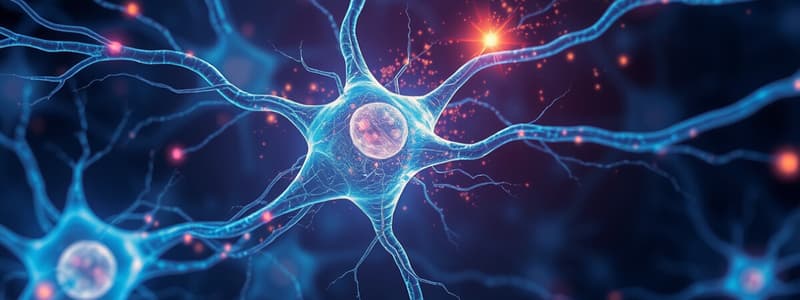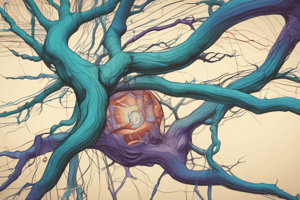Podcast
Questions and Answers
The final project requires a group presentation on a neural disorder that is covered in lectures.
The final project requires a group presentation on a neural disorder that is covered in lectures.
False (B)
There are a total of four quizzes scheduled in the assessment plan.
There are a total of four quizzes scheduled in the assessment plan.
False (B)
The weightage of the final exam accounts for 30% of the overall assessment.
The weightage of the final exam accounts for 30% of the overall assessment.
True (A)
The midterm exam will cover concepts discussed from weeks 1-6.
The midterm exam will cover concepts discussed from weeks 1-6.
Students must submit their responses for the assignment by week 5.
Students must submit their responses for the assignment by week 5.
The quizzes will each have a weightage of 10% in the overall assessment.
The quizzes will each have a weightage of 10% in the overall assessment.
The assignment involves writing a 1000-word essay based on a topic assigned by the instructor.
The assignment involves writing a 1000-word essay based on a topic assigned by the instructor.
True or false questions in assessments carry a visibility of 1 mark each.
True or false questions in assessments carry a visibility of 1 mark each.
Botulinum toxin causes paralysis by enhancing the release of acetylcholine from somatic motor neurons.
Botulinum toxin causes paralysis by enhancing the release of acetylcholine from somatic motor neurons.
An agonist binds to receptors and blocks the effect of a natural neurotransmitter.
An agonist binds to receptors and blocks the effect of a natural neurotransmitter.
Zyprexa® is classified as an antagonist of serotonin and dopamine.
Zyprexa® is classified as an antagonist of serotonin and dopamine.
Cocaine promotes euphoria by facilitating the reuptake of dopamine in the synaptic cleft.
Cocaine promotes euphoria by facilitating the reuptake of dopamine in the synaptic cleft.
A neural circuit can consist of a network of interconnected brain regions that integrate large amounts of information.
A neural circuit can consist of a network of interconnected brain regions that integrate large amounts of information.
In a simple series circuit, a single presynaptic neuron stimulates multiple postsynaptic neurons at once.
In a simple series circuit, a single presynaptic neuron stimulates multiple postsynaptic neurons at once.
Divergence in neural circuits allows one presynaptic neuron to influence multiple postsynaptic neurons simultaneously.
Divergence in neural circuits allows one presynaptic neuron to influence multiple postsynaptic neurons simultaneously.
Most neural circuits operate in a straightforward and uncomplicated manner.
Most neural circuits operate in a straightforward and uncomplicated manner.
Glutamate is classified as an inhibitory neurotransmitter.
Glutamate is classified as an inhibitory neurotransmitter.
Gamma-Aminobutyric acid (GABA) is known for its excitatory effects on neurons.
Gamma-Aminobutyric acid (GABA) is known for its excitatory effects on neurons.
Acetylcholine (ACh) can act as both an excitatory and an inhibitory neurotransmitter.
Acetylcholine (ACh) can act as both an excitatory and an inhibitory neurotransmitter.
Epinephrine is also known as norepinephrine.
Epinephrine is also known as norepinephrine.
Dopamine is solely an excitatory neurotransmitter.
Dopamine is solely an excitatory neurotransmitter.
Serotonin (5-HT) functions exclusively to inhibit neuron activity.
Serotonin (5-HT) functions exclusively to inhibit neuron activity.
Histamine is a type of neuromodulator.
Histamine is a type of neuromodulator.
Norepinephrine is considered a primary excitatory neurotransmitter.
Norepinephrine is considered a primary excitatory neurotransmitter.
The action of neurotransmitters is determined by the binding of receptors on the presynaptic neuron.
The action of neurotransmitters is determined by the binding of receptors on the presynaptic neuron.
The parallel after-discharge circuit is primarily involved in complex cognitive functions.
The parallel after-discharge circuit is primarily involved in complex cognitive functions.
The firing action potential of a neuron can be influenced by the type of neurotransmitter released.
The firing action potential of a neuron can be influenced by the type of neurotransmitter released.
Neuroplasticity can result in negative changes that may have pathological consequences.
Neuroplasticity can result in negative changes that may have pathological consequences.
Neuromodulators directly trigger the action potential in neurons.
Neuromodulators directly trigger the action potential in neurons.
Inhibitory neurotransmitters increase the likelihood that a neuron will fire.
Inhibitory neurotransmitters increase the likelihood that a neuron will fire.
Dopamine production is a function associated with the cerebellum.
Dopamine production is a function associated with the cerebellum.
Excitatory neurotransmitters decrease the action potential of neurons.
Excitatory neurotransmitters decrease the action potential of neurons.
The process of synaptic delay results in multiple EPSPs or IPSPs at the last neuron.
The process of synaptic delay results in multiple EPSPs or IPSPs at the last neuron.
All neurotransmitters have a single type of function.
All neurotransmitters have a single type of function.
Neuroplasticity does not play a significant role in recovery after brain injuries like a stroke.
Neuroplasticity does not play a significant role in recovery after brain injuries like a stroke.
The basal ganglia are located in the outer regions of the brain.
The basal ganglia are located in the outer regions of the brain.
Neurotransmitters can activate multiple receptors simultaneously.
Neurotransmitters can activate multiple receptors simultaneously.
The four subsystems controlling movement include circuitry in the gray matter of the spinal cord.
The four subsystems controlling movement include circuitry in the gray matter of the spinal cord.
Temporal changes in neuroplasticity occur at the level of individual neurons and can be divided into short-term and long-term changes.
Temporal changes in neuroplasticity occur at the level of individual neurons and can be divided into short-term and long-term changes.
Neurogenesis occurs naturally in the adult human brain only in the hippocampus.
Neurogenesis occurs naturally in the adult human brain only in the hippocampus.
Epidermal growth factor (EGF) has no significant role in the proliferation of neurons in adult brains.
Epidermal growth factor (EGF) has no significant role in the proliferation of neurons in adult brains.
The lack of neurogenesis in adult humans is primarily due to the absence of certain cues that were present during fetal development.
The lack of neurogenesis in adult humans is primarily due to the absence of certain cues that were present during fetal development.
Oligodendrocytes inhibit neurogenesis in adult brains.
Oligodendrocytes inhibit neurogenesis in adult brains.
Following axonal damage in the CNS, astrocytes develop a type of barrier that aids regeneration.
Following axonal damage in the CNS, astrocytes develop a type of barrier that aids regeneration.
Axons in the central nervous system (CNS) are myelinated by Schwann cells.
Axons in the central nervous system (CNS) are myelinated by Schwann cells.
Transplantation of cultured neurons is one of the research avenues explored to replace damaged neurons.
Transplantation of cultured neurons is one of the research avenues explored to replace damaged neurons.
Neurological disorders encompass conditions affecting only the brain but not the spinal cord or nerves.
Neurological disorders encompass conditions affecting only the brain but not the spinal cord or nerves.
Study Notes
Neurotransmitters
- Neurotransmitters can be excitatory or inhibitory, affecting neuronal firing and action potential.
- Each neurotransmitter type can activate multiple receptors on postsynaptic neurons.
Examples of Neurotransmitters
-
Excitatory:
- Glutamate (Glu)
- Acetylcholine (ACh)
- Dopamine (DA)
- Norepinephrine (NE) [Noradrenaline]
- Epinephrine (Epi) [Adrenaline]
-
Inhibitory:
- gamma-Aminobutyric acid (GABA)
- Serotonin (5-HT)
-
Neuromodulators:
- Dopamine (DA)
- Acetylcholine (ACh)
- Histamine
Modifying Neurotransmitter Effects
- Agonists enhance or mimic neurotransmitter effects; e.g., Isoproterenol dilates airways during asthma.
- Antagonists block neurotransmitter receptors; e.g., Zyprexa® is an antagonist for serotonin and dopamine.
- Cocaine inhibits dopamine reuptake, extending its presence in synaptic clefts, causing euphoria.
Neural Circuits
- Neural circuits consist of interconnected neurons processing specific information.
- Simple circuits involve a single presynaptic neuron influencing one postsynaptic neuron.
- More complex circuits allow a single presynaptic neuron to influence multiple postsynaptic neurons (divergence).
Neural Circuit Functions
- Neural circuits are essential for sensory processing, motor outputs, and cognitive functions.
- They consist of several subsystems like local circuitry in spinal cord, brainstem neurons, cerebellum, and basal ganglia.
- Disorders in basal ganglia, such as Parkinson's and Huntington's disease, impair voluntary movement initiation.
Neuroplasticity
- Neuroplasticity enables the nervous system to reorganize structure and functions in response to stimuli.
- Changes can be beneficial, neutral, or pathological and occur temporally (functional) or spatially (structural).
- Neuroplasticity supports brain recovery post-injury, influencing clinical interventions and improving patient outcomes.
Neurogenesis
- Neurogenesis is the formation of new neurons from stem cells and occurs in specific brain areas, such as the hippocampus.
- Discovery of epidermal growth factor (EGF) revealed the potential for new neuron generation in adult brains.
- Limited neurogenesis in other brain areas is due to inhibitory influences from neuroglia and missing growth cues.
- Research aims to promote neuronal regeneration and repair, particularly in spinal cord injuries.
Genetics and Neurological Disorders
- Neurological disorders encompass conditions like Alzheimer’s, Parkinson's, epilepsy, and multiple sclerosis, affecting brain and nerve function.
Studying That Suits You
Use AI to generate personalized quizzes and flashcards to suit your learning preferences.
Related Documents
Description
This quiz explores the role of neurotransmitters in activating receptors and influencing neuron firing. It covers the excitatory and inhibitory effects of neurotransmitters and how they contribute to communication within the nervous system. Test your knowledge on the complexities of these biochemical messengers!




